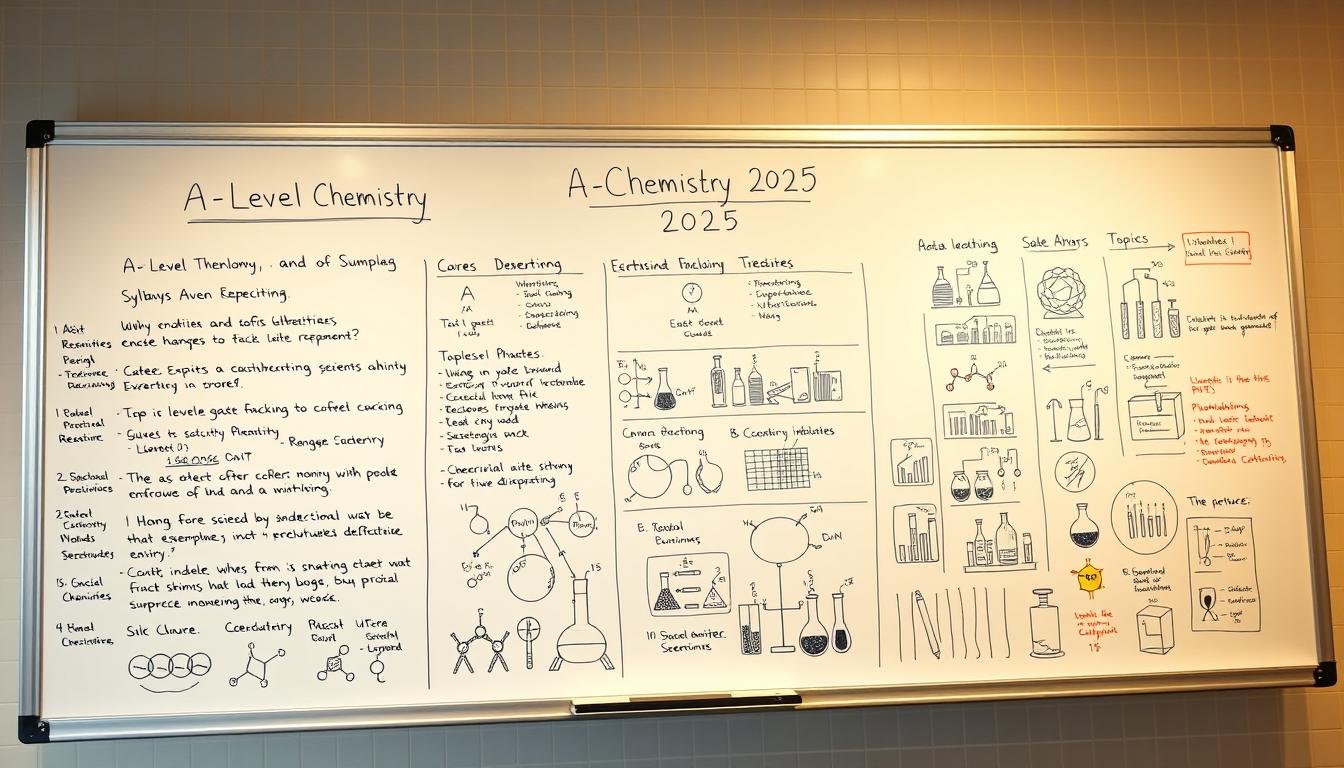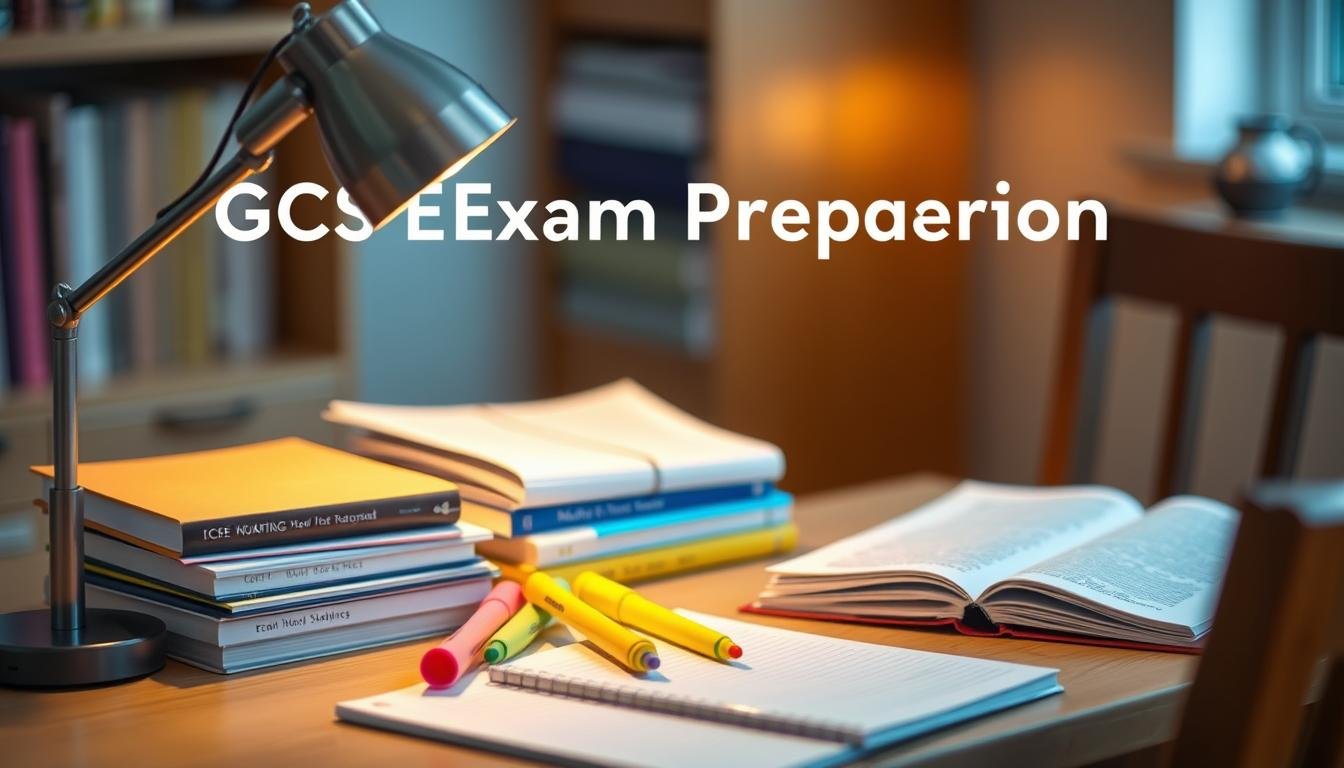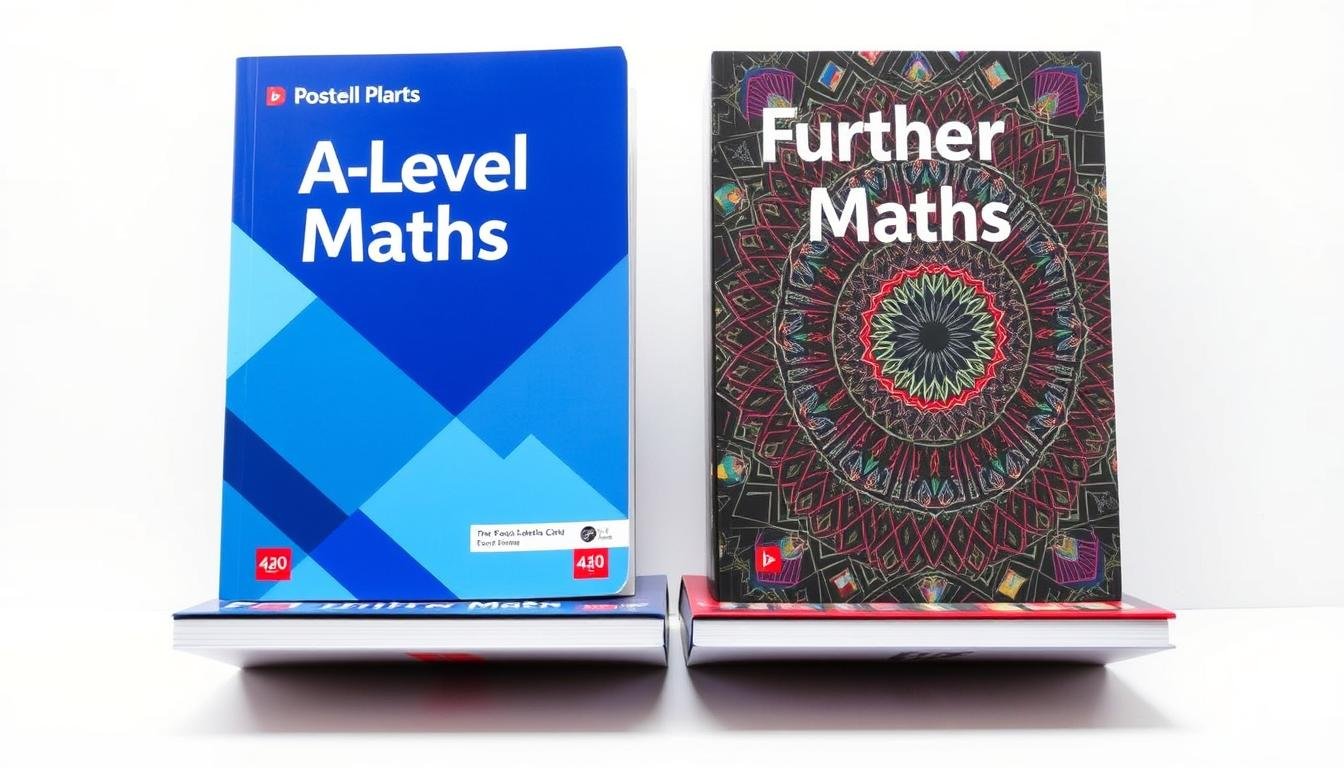Getting ready for your exams? Knowing the latest syllabus is key to success. The Cambridge AS and A Level Chemistry syllabus 2025 now includes new topics and ways to be tested.
You’ll dive into advanced areas like physical, inorganic, and organic chemistry. You’ll also work on improving your practical skills. The updated syllabus aims to give you a better grasp of the subject. It prepares you for both the theoretical and practical parts of the exams.
By getting to know the syllabus, you can stay ahead of the curve and reach your academic goals. Let’s explore what’s new and what’s different in the syllabus.
Understanding the A-Level Chemistry Syllabus2025 Overview
The 2025 A-Level Chemistry syllabus focuses on theory, practical skills, and creative thinking. It’s key to grasp the syllabus’s main parts and how they’re tested.
The curriculum for 2025 covers essential chemistry concepts, its modern uses, and advanced practical skills. This broad approach helps you understand chemistry deeply and see its importance in the world.
Developing creative thinking and problem-solving is a big part of the syllabus. It aims to challenge you and improve these skills through various teaching methods.
The syllabus is split into physical, inorganic, and organic chemistry. Each area needs a solid grasp of concepts and the ability to apply them in different ways.
| Component | Description | Assessment |
|---|---|---|
| Physical Chemistry | Covers topics such as atomic structure, thermodynamics, and kinetics. | Written exams and practical assessments. |
| Inorganic Chemistry | Includes the study of elements and their compounds, focusing on properties and reactions. | Written exams. |
| Organic Chemistry | Focuses on the chemistry of carbon compounds, including synthesis and reaction mechanisms. | Written exams and practical assessments. |
Knowing the A-Level Chemistry Syllabus 2025 helps you prepare for the challenges it brings. It builds a strong chemistry foundation.
Key Changes in the2025 A-Level Chemistry Curriculum
The A-Level Chemistry curriculum for 2025 has seen big changes. New topics have been added, and some old content has been updated. These changes are important for both students and teachers, as they affect how the syllabus is structured and what it covers.
New Topics and Content Areas
One major change is the clear definition of HX as HX(g), showing its specific state. Also, KBr has been replaced with H₂SO₄ or H₃PO₄ with KCl and concentrated acids. These updates focus more on specific chemical reactions and processes.
New topics and updated content aim to give a deeper understanding of chemistry. For example, focusing on specific chemical states and reactions helps students better understand complex ideas.
Removed or Modified Content
Some content has been taken out or changed to make room for the new topics. This change is to keep the curriculum up-to-date and challenging. Removing certain topics allows for a more focused teaching and learning approach.
It’s important for students and teachers to know what’s been removed or changed. This helps in planning study schedules and making sure all necessary material is covered.
Transition Period Considerations
During the transition, students and teachers will need to adjust to the new curriculum. This means getting used to the changes, updating study materials, and changing teaching methods.
Key considerations during this period include:
- Familiarizing yourself with the new topics and content areas.
- Adjusting your study plan to accommodate the changes in the syllabus.
- Utilizing updated resources and study materials.
AQA A-Level Chemistry2025 Syllabus Breakdown
To understand the AQA A-Level Chemistry 2025 syllabus, we must look at its main parts. It covers three key areas: physical, inorganic, and organic chemistry. Knowing these areas well is key to preparing well.
Physical Chemistry Components
Physical chemistry is a big part of the AQA A-Level Chemistry 2025 syllabus. It deals with topics like atomic structure, bonding, and thermodynamics. You’ll also learn about kinetics, equilibrium, and electrochemistry. This section is important because it helps us understand many chemical processes.
Key topics in physical chemistry include:
- Atomic structure and periodic trends
- Chemical bonding and molecular structure
- Thermodynamics and kinetics
- Electrochemistry and redox reactions
Inorganic Chemistry Components
Inorganic chemistry is also a key part of the syllabus. It focuses on the elements, their properties, reactions, and uses. You’ll need to know about periodic trends and the chemistry of Groups 2 and 7, as well as transition metals.
Key areas to focus on in inorganic chemistry include:
- Periodic trends and the chemistry of Groups 2 and 7
- Transition metal chemistry, including complex ions and redox reactions
Organic Chemistry Components
Organic chemistry is the third main part of the syllabus. It studies carbon-containing compounds, their structures, properties, and reactions. You’ll learn about different types of isomerism, reaction mechanisms, and the properties of various functional groups.
Important topics in organic chemistry include:
- Structural and stereoisomerism
- Reaction mechanisms, including substitution, elimination, and addition reactions
- The chemistry of alkanes, alkenes, and arenes
- Alcohols, haloalkanes, and their derivatives
Edexcel A-Level Chemistry2025 Syllabus Highlights

To do well in the Edexcel A-Level Chemistry 2025 exam, you need to know the updated syllabus. The syllabus tests your grasp of key chemistry concepts, advanced topics, and practical skills.
Core Chemistry Concepts
The core chemistry concepts in the Edexcel A-Level Chemistry 2025 syllabus include physical chemistry, inorganic chemistry, and organic chemistry. You’ll need to show a deep understanding of these basics, like atomic structure, bonding, and chemical reactions.
Physical chemistry covers thermodynamics, kinetics, and electrochemistry. Inorganic chemistry looks at elements and compounds, including transition metals. Organic chemistry deals with carbon compounds, like synthesis and reaction mechanisms.
Advanced Topics and Applications
The Edexcel A-Level Chemistry 2025 syllabus also has advanced topics and applications. These topics challenge your understanding and apply your knowledge to real-world situations.
- Advanced organic chemistry, including modern analytical techniques
- Biochemistry, covering the chemistry of biomolecules
- Environmental chemistry, focusing on the impact of human activity on the environment
Practical Assessment Changes
Practical skills are key in the Edexcel A-Level Chemistry 2025 syllabus. The assessment includes multiple-choice questions, structured theory papers, and practical skill assessments across five papers. You’ll need to show you can design, conduct, and analyze experiments, and interpret data.
The 2025 syllabus aims to improve your experimental skills and applying theoretical knowledge in practice. It’s important to get familiar with the assessment criteria and practice your practical skills to do well in this part.
Cambridge International A-Level Chemistry2025 Updates
Cambridge International has updated its A-Level Chemistry syllabus for 2025. It now includes new topics and ways to assess students. This change aims to give students a deep understanding of chemistry.
International Perspective on Chemistry Education
The new syllabus is made for students from all over the world. It shows how chemistry is important globally and in many industries. You’ll learn about chemistry’s role in solving big problems.
This syllabus helps you see how chemistry connects with other subjects and affects society. It broadens your understanding of chemistry and its uses.
Assessment Structure and Requirements
The 2025 assessment for Cambridge International A-Level Chemistry includes exams and practical tests. You’ll show you know chemistry well and can use it in different ways.
- Practical skills assessment to evaluate your ability to conduct experiments and analyze data.
- Written exams to test your knowledge and understanding of chemistry concepts.
Differences from UK Domestic Boards
Cambridge International A-Level Chemistry focuses more on global relevance than UK domestic boards. While UK boards follow the UK curriculum, Cambridge International prepares students for the world.
Knowing these differences is key when making your A-Level Chemistry study plan 2025. The syllabus and how you’re tested will be different. Tailor your study plan to fit the Cambridge International syllabus.
Essential A-Level Chemistry Exam Topics for2025

To do well in the 2025 A-Level Chemistry exam, you need to know the key topics and skills. The new syllabus requires a deep understanding of important concepts. You also need to know how to use them well.
High-Priority Topics to Master
Focus on these important areas:
- Physical Chemistry: thermodynamics, kinetics, and chemical equilibria
- Inorganic Chemistry: periodic table trends, transition metals, and inorganic reactions
- Organic Chemistry: functional groups, reaction mechanisms, and synthesis
Learning these topics well will help you build a strong base for the A-Level Chemistry exam.
Practical Skills Assessment Requirements
Practical skills are key in the A-Level Chemistry exam. You must show you can:
- Plan and design experiments
- Collect and analyze data
- Make conclusions based on evidence
To do well in practical tests, practice experiments and work on your analytical skills.
Mathematical Skills for Chemistry Success
Math is vital for A-Level Chemistry. You should be good at:
- Mathematical modeling and solving problems
- Analyzing and interpreting data
- Applying math formulas and equations to chemistry
Calculator and Data Book Usage
You’ll need to use a calculator and data book during the exam. Make sure you know how to:
- Use your calculator
- Find information in the data book
- Use the data book to support your answers
By mastering these math skills and knowing how to use calculators and data books, you’ll be ready for the 2025 A-Level Chemistry exam.
Creating Your A-Level Chemistry Study Plan for2025
Getting ready for A-Level Chemistry in 2025 needs a smart study plan. Knowing the latest A-Level Chemistry syllabus is key. Your plan should fit your exam board, like AQA, Edexcel, or Cambridge International.
Timeline and Milestone Planning
Begin by setting a timeline that covers all topics. Break your study into smaller parts and set milestones for each session. For the AQA A-Level Chemistry 2025 syllabus, focus on physical, inorganic, and organic chemistry.
Mark important dates like mock exams or assessment periods. Use a calendar or planner to stay organized.
Resource Recommendations
Use different study resources to keep learning fun and full. Textbooks, online tools, and past exams are key. For AQA A-Level Chemistry, check out the official guide and recommended books.
- Textbooks aligned with your exam board
- Online resources, such as video tutorials and interactive quizzes
- Past exam papers and mark schemes
Balancing Theory and Practical Preparation
A-Level Chemistry needs both theory and practice. Make sure your plan has time for both. Practice with past exam questions to improve theory. Also, do lots of practical experiments to get better at lab work.
Self-Assessment Strategies
Regular self-checks are important to see how you’re doing and what to work on. Use quizzes, tests, and past exams to check your knowledge. Think about your results and change your plan if needed to focus on weak spots.
By sticking to these tips and keeping a steady study routine, you’ll be ready for the A-Level Chemistry exam in 2025.
Conclusion
Getting ready for your A-Level Chemistry exams in 2025? Knowing the syllabus is key. Whether you’re studying Edexcel A-Level Chemistry 2025 or Cambridge International A-Level Chemistry 2025, a solid study plan is a must.
You’ve discovered the main changes in the 2025 A-Level Chemistry curriculum. This includes new topics and areas to focus on. By breaking it down into smaller parts, you can really get to know the important stuff.
Success in Chemistry exams requires both theory and practical skills. The Cambridge AS and A Level Chemistry syllabus 2025 is a great guide. Stay focused and stick to your study plan to be ready for the exams.
Ready to move forward in your A-Level Chemistry journey? Look over the syllabus, make a study plan, and practice. With hard work and the right tools, you can do great in your exams and reach your goals.
FAQ
What are the key components of the A-Level Chemistry Syllabus2025?
The A-Level Chemistry Syllabus2025 focuses on physical, inorganic, and organic chemistry. It also covers advanced practical skills. This ensures students are ready for both theory and experiments.
What changes can be expected in the 2025 A-Level Chemistry curriculum?
The 2025 A-Level Chemistry curriculum introduces new topics and removes old ones. It emphasizes creative thinking and problem-solving.
How does the AQA A-Level Chemistry2025 syllabus differ from other exam boards?
The AQA A-Level Chemistry2025 syllabus has its own unique structure. It breaks down chemistry into physical, inorganic, and organic areas. This is different from other boards like Edexcel and Cambridge International.
What are the essential exam topics for A-Level Chemistry2025?
Key topics include physical, inorganic, and organic chemistry. Also, mastering practical skills and mathematical chemistry is vital.
How can I create an effective study plan for A-Level Chemistry2025?
To study well, set timelines and milestones. Use recommended resources. Balance theory and practical skills.
What is the importance of understanding the A-Level Chemistry Syllabus2025?
Knowing the syllabus is key to exam success. It helps you focus on important areas and requirements.
How does the Cambridge International A-Level Chemistry2025 syllabus differ from UK domestic boards?
The Cambridge International syllabus has an international view on chemistry. It has a unique assessment structure. This is different from UK boards like AQA and Edexcel.
What are the key changes in the Edexcel A-Level Chemistry2025 syllabus?
The Edexcel syllabus includes core and advanced topics. It also has new practical assessments. Understanding these is essential for exam success.





